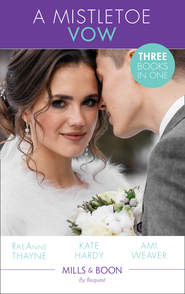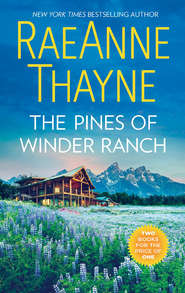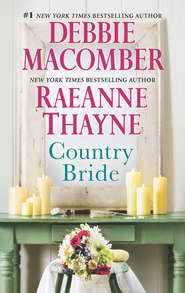По всем вопросам обращайтесь на: info@litportal.ru
(©) 2003-2025.
✖
Nothing To Lose
Автор
Год написания книги
2018
Настройки чтения
Размер шрифта
Высота строк
Поля
“I haven’t given up hope,” she said urgently into the phone, wishing more than anything that she could throw her arms around her brother. “I will never give up hope, Hunter. You did nothing wrong and I will do whatever it takes to prove that to the world.”
Whatever brief moment of levity they had shared over the memory of a stray mutt, Hunter had once more donned that impassive mask. “Don’t waste your life on me, Tay. I’m not worth it. Go back and finish your residency. Be a doctor. Help people.”
She wanted that—oh, how she wanted that—but right now she had other work.
“I’ll see you next Tuesday,” she said.
He looked as if he wanted to argue, but the guard roughly snapped on the transfer handcuffs and led him out of the room.
She watched him go, his back tall and straight, and wondered how much more of him would crumble away before next Tuesday.
Wyatt never minded waiting.
He considered it research, a rare and wonderful chance to study people in a variety of situations, the whole rich texture of the human experience.
He spent the twenty minutes he waited for Taylor cataloguing the others in the waiting room, wondering about their stories, imagining the journeys their lives had taken to lead them to this point.
As he did wherever he went, his mind recorded impressions as he looked around the room.
He saw an older woman with stunning blue eyes and a face etched with character holding tight to the arms of her chair, her spine straight and her feet in their sensible brown shoes precisely lined up on the floor. Was she here to see a son or a grandson? he wondered.
Across the room sat a man of about fifty with a tattoo of an American flag just below his shirtsleeve and an Elvis-like pompadour and sideburns. He was a mechanic, Wyatt figured, at least judging by the grime under his fingernails and the faint shadow of permanent oil stains on the knees of his jeans. The man fidgeted and glanced at the clock every few moments while pretending to leaf through a hot-rod magazine.
Nearest the door to the visiting area sat a pregnant girl who couldn’t have been a day older than eighteen, her belly stretched beneath a blue T-shirt that exposed a few inches of skin above her low-rider jeans. She chewed gum loudly and looked bored to tears, but every once in a while she paused to lay a loving hand across her stomach and her heavily made-up features would soften with a warm maternal glow.
No, he didn’t mind waiting. This was life, gritty and real.
He was making a few notes from his conversation with Hunter in the steno notebook he had carried in with him when the man’s sister walked through the checkpoint.
She wasn’t a frail woman by any means, but for just a moment as she paused there at the entrance to the waiting room, she looked fragile, brittle almost. When she caught sight of him, he watched her take a deep breath and then paste on a polite smile as she walked toward him with a grace that seemed out of place here.
“Mr. McKinnon. Thank you for waiting.”
She was extraordinarily beautiful, he thought, with that luminous skin and those dark blue eyes. He wondered if she had any idea how fresh and lovely she looked here in these grim surroundings, even with exhaustion stamped on her features.
“No problem. I didn’t mind, especially since I cut into your time with your brother.”
She looked as if she wanted to say something, then changed her mind.
“I wanted to apologize for the other night at your book signing, for coming on so strong,” she said after a moment. “I suppose I’m a little too protective of Hunter. He tells me I am, anyway.”
“It’s natural in this situation. Perfectly understandable. You want to make everything right again for him, the way things were before all of this happened.”
“I can’t do that.” The bleakness in her voice gave him the oddest urge to pull her into his arms.
“Probably not.” He debated the wisdom of his next words, then threw caution to the wind. “Your brother knows his own mind. Despite the fact that most of his life is out of his control now and other people now tell him when he can shower and what he can eat, he’s not helpless. He has his reasons for wanting to tell his story and he trusts me not to write a ‘salacious’ book. Maybe you should too.”
She winced at his deliberate use of her word from the other night. “I’m sorry. I shouldn’t have said that. I’ve read a few of your books and none of them were salacious. I’m sure this one wouldn’t be either.”
She closed her eyes for a moment and he was struck by the pale tracery of veins in her eyelids. She had the delicate skin of a redhead but she still looked as if she had spent too much time indoors lately.
When she opened her eyes again there was a determined light in them. “You’re right, Hunter wants you to do this book and he’s asked me to cooperate with you. I can do little enough to help him, but at least I can do this.”
“Against your better instincts.”
“Maybe. But haven’t you ever gone ahead with something when your instincts were telling you to run, Mr. McKinnon?”
He thought of how his own instincts were warning him right now to run away from this woman with her expressive eyes and her passionate defense of her brother. If he let her, he had a strong feeling she could be hazardous not only to this project but, worse, to his heart.
“Listen, I know a great diner in Draper,” he said, deciding to ignore his better judgment. “What do you say I buy you a cup of coffee and we can talk about the book? I’ll see if I can allay some of your concerns—and maybe convince you to call me Wyatt.”
Indecision flickered on her features. She started to nibble her lip, then checked the motion. “All right,” she said, with a quick glance at her watch. “I have a study group at seven but I’m free until then.”
Wyatt refused to worry about the excitement flowing through him at the idea of spending a few more minutes with Taylor Bradshaw.
Chapter 3
He beat her to the diner.
Despite the hour—too early for dinner, too late for lunch—several of the booths at Dewey’s were full when Wyatt walked inside alone. The squat, unassuming restaurant served to-die-for mashed potatoes and several kinds of divine pie. It was a popular spot with visitors to the prison and with guards after their shifts.
He had always found it odd how much economic development seemed to spring up around prisons, the thriving little microeconomies correctional facilities fostered.
Taylor arrived just as the hostess was finding a booth for them. “Sorry,” she said, somewhat breathlessly. “I wasn’t paying attention and drove right past the place.”
“No problem. You’re here now.”
They slid into opposite sides of the brown vinyl booth with the awkwardness of near-strangers suddenly finding themselves in close quarters. After a few moments of perusing the menu, Taylor ordered a chicken taco salad and a diet cola while he settled for coffee and a slice of Dewey’s famous boysenberry pie.
“I didn’t have time for lunch today,” Taylor explained after the waitress walked away to give their order to the kitchen, “and my study group will probably go long past dinnertime. This might be my only chance to eat until midnight.”
“What class is your study group for?”
She made a face. “Constitutional law. My least favorite class. I need all the help I can get in there.”
“Why would a medical student need to study constitutional law?” he asked, genuinely baffled.
“A medical student wouldn’t. It’s a requirement for second-year law students, though.”
He stared at her. “When did that happen? During the trial I could swear I heard you were attending the U. medical school, that you were close to graduation. I thought somebody told me you intended to specialize in pediatrics.”
If he hadn’t been watching her so closely, he might have missed the quick spasm of misery that crossed her features before they became impassive again.
“Things change.”
“Wow. I’ll say. Law school now? That’s a major career shift.”
She absently fiddled with a sugar packet from the wire rack on the table. “Sometimes you think you have your life all nicely mapped out. Then fate picks you up, shakes you around until your teeth rattle, and plops you down on a completely different path.”











